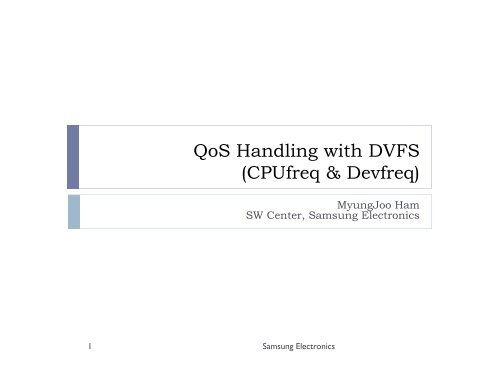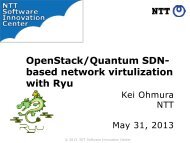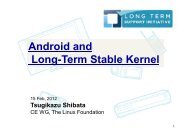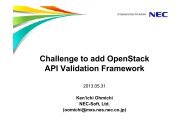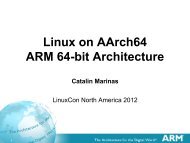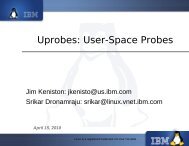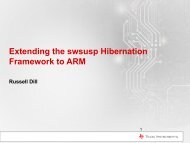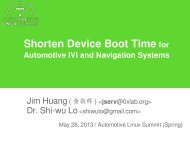QoS Handling with DVFS (CPUfreq & Devfreq) - The Linux Foundation
QoS Handling with DVFS (CPUfreq & Devfreq) - The Linux Foundation
QoS Handling with DVFS (CPUfreq & Devfreq) - The Linux Foundation
- No tags were found...
You also want an ePaper? Increase the reach of your titles
YUMPU automatically turns print PDFs into web optimized ePapers that Google loves.
Topics Introduction <strong>DVFS</strong> (Dynamic Voltage & Frequency Scaling) <strong>QoS</strong> (Quality of Service) <strong>The</strong> Issues & Solutions <strong>QoS</strong> on <strong>DVFS</strong> devices <strong>QoS</strong> on <strong>DVFS</strong> mechanisms Conclusion Preliminary Experimental Results3Samsung Electronics
Introduction• <strong>DVFS</strong>• <strong>QoS</strong>• TermsIssues & SolutionsConclusion4Samsung Electronics
<strong>Linux</strong> Kernel Power Management<strong>Linux</strong> 3.4<strong>The</strong>rmalPM-<strong>QoS</strong>FrameworkDriverDriver (arch)<strong>CPUfreq</strong><strong>CPUfreq</strong> DrvCPUCPUidleHotplugSoC/CPU Architecture SupportSuspend<strong>Devfreq</strong><strong>Linux</strong> Driver ModelRuntime-PMOPPOPP SpecDevice DriverPower DomainClockSoC/CPU Architecture SupportHardwareRegulatorRegulator Drv5 • <strong>The</strong> frameworks are not hierarchical. Connections show typical Samsung usage. Electronics
Intro: <strong>DVFS</strong> 1/2 Dynamic Voltage and Frequency Scaling <strong>CPUfreq</strong>: <strong>DVFS</strong> for CPU Core <strong>Devfreq</strong>: <strong>DVFS</strong> for other devices Memory-Interface, Bus, GPU, …6Samsung Electronics
Intro: <strong>DVFS</strong> 2/2 Sampling the utilization, periodically Adjust frequency based on the utilization Adjust voltage based on frequencyU = Measure CPU UtilizationU > Th_UpNoU < Th_DownNoWait for next samplingYesYesAdjust Frequency & Voltage7Samsung Electronics
Intro: <strong>QoS</strong> <strong>Linux</strong> PM-<strong>QoS</strong> Framework Global <strong>QoS</strong> Request “CPU-DMA-Latency”, “Network-Throughput”, “Network-Latency” Per-dev <strong>QoS</strong> Request “Device A”, “S5Pxxx.0” Manage <strong>QoS</strong> Requests for <strong>QoS</strong> Handlers1. Thread A: DMA latency < 100us2. Thread B: DMA latency < 15us PM-<strong>QoS</strong> tells DMA driver: “Do < 15us”3. Thread B: Cancel the request PM-<strong>QoS</strong> tells DMA driver: “Do < 100us”4. …8Samsung Electronics
Intro: Terms <strong>DVFS</strong> Target A device w/ <strong>DVFS</strong> capability <strong>DVFS</strong> Target = CPU w/ <strong>CPUfreq</strong> <strong>DVFS</strong> Driver Device driver controlling <strong>DVFS</strong> mechanism of a <strong>DVFS</strong> target. (<strong>CPUfreq</strong>) <strong>DVFS</strong> Driver = “/drivers/cpufreq/exynos4x12-cpufreq.c”9Samsung Electronics
IntroductionIssues & Solutions• <strong>QoS</strong> on <strong>DVFS</strong> Devices• <strong>QoS</strong> on <strong>DVFS</strong> MechanismsConclusion10Samsung Electronics
Performance Issues of <strong>DVFS</strong>: 1/3 Issue 1: Too Late to ReactLoadUtil = 60% Util = 99%.React!Util = 0%t11Samsung Electronics
Performance Issues of <strong>DVFS</strong>: 2/3 Issue 2: Cannot Detect Short BurstsLoadt12Samsung Electronics
Performance Issues of <strong>DVFS</strong>: 3/3 Issue 3: Asymmetric Inter-device Dependency DMA op latency/throughput depends on CPU frequency. Activity on DMA doesn’t affect CPU load.CPU CoresDMA Devices(GPU, Display, Codec HW, …)DMA ActivityCannot affect<strong>CPUfreq</strong>X<strong>CPUfreq</strong>Affects Bus/Mem SpeedDMA ActivityBusMemory13Samsung Electronics
IntroductionIssues & Solutions• Performance Issues of <strong>DVFS</strong>• <strong>QoS</strong> on <strong>DVFS</strong> MechanismsConclusion14Samsung Electronics
<strong>The</strong> Possible Solution <strong>QoS</strong> handling at <strong>DVFS</strong> devices Let <strong>DVFS</strong> frameworks (<strong>CPUfreq</strong>/<strong>Devfreq</strong>) handlenot, each <strong>DVFS</strong> drivers. Based on the table given by <strong>DVFS</strong> drivers E.g., Bus frequency100MHz133MHz266MHz400MhzDMA Throughput640MB/s851MB/s1702MB/s2560MB/s15Samsung Electronics
<strong>QoS</strong> on <strong>DVFS</strong> Devices (<strong>DVFS</strong> f/w) Add the following information (devfreq driver) at probe <strong>QoS</strong>-related info for <strong>Devfreq</strong> driver (/include/linux/devfreq.h) struct devfreq_pm_qos_table { unsigned long freq; /* 0 if this is the last element */s32 qos_value; }; struct devfreq_dev_profile {…… /* Optional <strong>QoS</strong> <strong>Handling</strong> Specification */ int qos_type; /* Global <strong>QoS</strong> Requests */ bool qos_use_max; /* Throughput-like? Or Latency-like? */ bool enable_dev_pm_qos; /* Per-dev <strong>QoS</strong> Requests */ };struct devfreq_pm_qos_table *qos_list;16Samsung Electronics
<strong>QoS</strong> on <strong>DVFS</strong> Devices (<strong>DVFS</strong> f/w): Works! Issue1, “Touchscreen Event” User touch event <strong>QoS</strong> request “at least 1000 BogoMIPs” <strong>CPUfreq</strong> runs CPU at 1GHz Reacting in ~100us (almost same w/ Issue 2) Issue 3, “Video Decoding” Video decoder gets a 1080p60Hz job <strong>QoS</strong> request “DMA throughput of 2.4GB/s” <strong>CPUfreq</strong> runs CPU at 500MHz No performance issues17Samsung Electronics
<strong>Handling</strong> <strong>QoS</strong> Requests: Design-BeforeFramework<strong>The</strong>rmalPM-<strong>QoS</strong>DriverDriver (arch)CPUHotplug<strong>CPUfreq</strong> CPUidleSuspend <strong>Devfreq</strong> Runtime-PM<strong>CPUfreq</strong> DrvSoC/CPU Architecture SupportAggregates <strong>QoS</strong> Requests.<strong>Linux</strong> Driver ModelNo considerations for <strong>DVFS</strong>OPPDevice DriverOPP SpecPower DomainClockSoC/CPU Architecture SupportHardwareRegulatorRegulator Drv18•<strong>The</strong> frameworks are not hierarchical. Connections show typical Samsung usage. Electronics
<strong>Handling</strong> <strong>QoS</strong> Requests: Design-AfterPM-<strong>QoS</strong>FrameworkDriver<strong>QoS</strong>-aware CPU<strong>DVFS</strong> f/w<strong>CPUfreq</strong> CPUidleSuspend <strong>Devfreq</strong> Runtime-PM<strong>QoS</strong> Spec<strong>CPUfreq</strong> DrvHotplugSoC/CPU Architecture Support<strong>Linux</strong> Driver ModelDriver (arch)Adding <strong>QoS</strong> Spec (List of {freq, <strong>QoS</strong>-Value})enables <strong>QoS</strong> handling at <strong>DVFS</strong> frameworksOPPOPP Spec<strong>QoS</strong> Spec<strong>Devfreq</strong> DriverDevice DriverPower DomainClockSoC/CPU Architecture SupportHardwareRegulatorRegulator Drv19•<strong>The</strong> frameworks are not hierarchical. Connections show typical Samsung usage. Electronics
<strong>Handling</strong> <strong>QoS</strong> Requests: How it Works<strong>QoS</strong>Requester 1<strong>QoS</strong>Requester 2PM-<strong>QoS</strong>Framework<strong>DVFS</strong>Framework<strong>DVFS</strong>Driver (bus)DMA throughput> 1GB/sDMA throughput> 1.5GB/sDMA throughput> 1GB/sDMA throughput> 1.5GB/s<strong>DVFS</strong> thinks bus needs 400MHz<strong>DVFS</strong> thinks bus needs 133MHzBut <strong>QoS</strong> constraints at 266MHz<strong>DVFS</strong> f/w sets bus-min = 266Set Bus 266MHz266MHz is enough.No changes in bus-minSet Bus 400MHzSet Bus 266MHzDMA throughput> 0.5GB/s1.5 > 0.5. Don’t talk to <strong>DVFS</strong> f/wDMA throughput> 0GB/s (don’t care)DMA throughput> 0.5GB/s<strong>DVFS</strong> f/w sets bus-min = 166Set Bus 166MHz20Samsung Electronics
<strong>Handling</strong> <strong>QoS</strong> Requests: Status New Global <strong>QoS</strong> Metrics Required DMA-Throughput: use kbytes/sec? GPU Performance: ??? CPU Performance: ??? (BogoMIPS?? MIPS?? Clock?? …) <strong>QoS</strong>-Extension for <strong>CPUfreq</strong> Work-to-do: <strong>Handling</strong> global <strong>QoS</strong> (after we get the metric) <strong>QoS</strong>-Extension for <strong>Devfreq</strong> Done: <strong>Handling</strong> global <strong>QoS</strong> and per-dev <strong>QoS</strong> In-progress: test & evaluation 3.5/3.6 Materials?21Samsung Electronics
IntroductionIssues & Solutions• Performance Issues of <strong>DVFS</strong>• <strong>QoS</strong> on <strong>DVFS</strong> DevicesConclusion22Samsung Electronics
<strong>DVFS</strong> Response Latency: Motivation Reviving the “Issue 1” Responding to user inputs (e.g., mobile phone touchscreen) Case 1 Launching an app / Menuscreen flipping Requires high performance. (Nearly full) Case 2 Typing a TXT / Email Requires low-mid performance. (Often lowest) <strong>QoS</strong> requests upon inputs Unconditional performance increase. Case 2 wastes power! Do NOT increase performance unconditionally! Decide faster, not acting blindly. Control <strong>DVFS</strong> behavior!23Samsung Electronics
<strong>DVFS</strong> Response Latency: Design Request faster reaction from <strong>DVFS</strong> mechanism.<strong>DVFS</strong> SamplingLoadAn EventAn EventLoadAn EventAn Eventtt24Samsung Electronics
<strong>DVFS</strong> Response Latency: DesignPM-<strong>QoS</strong>FrameworkDriverDriver (arch)<strong>QoS</strong>-aware <strong>DVFS</strong> f/wCPU<strong>CPUfreq</strong> CPUidleSuspend <strong>Devfreq</strong> Runtime-PMHotplugResponse Latency Self-aware<strong>CPUfreq</strong> DrvSoC/CPU Architecture Support <strong>Linux</strong> Driver Model<strong>DVFS</strong> f/w (daemon)<strong>Devfreq</strong> DriverOPPDevice DriverOPP SpecPower DomainClockSoC/CPU Architecture SupportHardwareRegulatorRegulator Drv26•<strong>The</strong> frameworks are not hierarchical. Connections show typical Samsung usage. Electronics
<strong>DVFS</strong> Response Latency:(<strong>DVFS</strong> f/w) Add the following information (devfreq driver) at probe <strong>QoS</strong>-related info for <strong>Devfreq</strong> driver (/include/linux/devfreq.h) struct devfreq_dev_profile {…… /* Optional <strong>DVFS</strong>-Response-Latency <strong>QoS</strong> <strong>Handling</strong> Specification */ bool support_dvfs_latency; /* Enable the feature */ }; <strong>The</strong> <strong>Devfreq</strong> f/w will update sampling rate accordingly27Samsung Electronics
<strong>DVFS</strong> Response Latency: Status Used in some product kernels. Trying to upstream <strong>QoS</strong> (global) Metric: “<strong>DVFS</strong>_RESPONSE_LATENCY” in us? For <strong>DVFS</strong> drivers registered. (?) Different “classes” of <strong>DVFS</strong> drivers??? <strong>CPUfreq</strong> Done: Instant reaction patch Work-to-do: redo response-latency after the metric is concluded. <strong>Devfreq</strong> Done: patchset In-progress: test & evaluation29Samsung Electronics
IntroductionIssues & SolutionsConclusion30Samsung Electronics
Conclusion – Future Work 1/3 What’s Next – 1 Test & Evaluation <strong>QoS</strong> <strong>Handling</strong> in <strong>Devfreq</strong> <strong>DVFS</strong>-Response-Latency <strong>Handling</strong> in <strong>Devfreq</strong> & <strong>CPUfreq</strong> Development <strong>QoS</strong> <strong>Handling</strong> in <strong>CPUfreq</strong> <strong>QoS</strong> Metrics <strong>DVFS</strong>-Response-Latency? DMA Throughput GPU???31Samsung Electronics
Conclusion – Future Work 2/3 What’s Next – 2 <strong>The</strong>rmal-aware <strong>DVFS</strong> Integrating w/ <strong>The</strong>rmal f/w <strong>DVFS</strong> driver = <strong>The</strong>rmal cooler device Scheduler-aware <strong>DVFS</strong> Turbo Boost*-like Support Adjust MAX freq according to # cores activated # Threads # Cores activated32* Trademark of Intel Samsung Electronics
Conclusion – Future Work 3/3 Future Work (farther…) (Many) Multi/Hetero-core <strong>DVFS</strong> Support Scheduler support might kick in. ARM Cortex A15 Big-Little model is the starting point. Compiler/Algorithm support for <strong>DVFS</strong> mechanisms Had some approaches, but not efficient enough (yet)33Samsung Electronics
Thank you!34Samsung Electronics
Appendix35Samsung Electronics
Appendix: Links to Related Code <strong>Devfreq</strong> <strong>Linux</strong> 3.4 rc7 Tovalds’ Header / Core / Default-Governor (Daemon) <strong>Devfreq</strong>/<strong>CPUfreq</strong>/PM-<strong>QoS</strong> for <strong>Linux</strong> 3.5/3.6PM / devfreq: handling <strong>QoS</strong> reqest on <strong>DVFS</strong> response latency (work-in-progress)PM / devfreq: support per-dev PM-<strong>QoS</strong> in devfreq (not sent)<strong>CPUfreq</strong> ondemand: handle <strong>QoS</strong> request on <strong>DVFS</strong> response... (pending)<strong>CPUfreq</strong> ondemand: update sampling rate <strong>with</strong>out waiting... (accepted)PM / <strong>QoS</strong>: add pm_qos_update_request_timeout API (accepted)PM / <strong>QoS</strong>: Introduce new classes: DMA-Throughput and... (pending)PM / devfreq: add relation of recommended frequency. (accepted)PM / devfreq: add PM <strong>QoS</strong> support (pending)36Samsung Electronics


